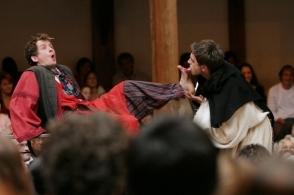In Extremis - Shakespeare's Globe 2006
Bringing up the rear, as it were, in this year's season at Shakespeare's Globe is this new play by Howard Brenton. Controversy has played a part in Brenton's career since his play 'The Romans in Britain' was subject to litigation because of a male rape scene which the infamous moral decency campaigner, Mary Whitehouse, took exception to (even though she never saw the play herself) causing her to take out a private prosecution against the director of the piece, Michael Bogdanov.
Sensitive theatregoers need not be too alarmed, because there won't be quite so much controversy surrounding this play, though it certainly has an earthy dose of sex, and there's a castration scene which might send shivers down a few spines.
The play is set in twelfth century France where the intelligentsia are locked in intellectual skirmishings about the nature of god and man, faith and numerous other ethereal concepts. Up and coming student, Peter Abelard, leads his teacher to the verge of a nervous breakdown with his philosophical tenets. Before long, the confident - and not a little arrogant - Abelard, takes up the teaching reigns himself and quickly whips up a substantial reputation. So much so that he's invited to tutor the niece of a wealthy notable, but he's almost instantly captivated by the beautiful (and very young) Heloise, and is soon widening her curriculum and teaching her rather more than philosophy, or any other subject on the academic agenda for that matter. Before long, every one knows what's afoot, and when Heloise's enraged Uncle discovers what's been going on under his very own roof, he seeks revenge even though Abelard does the decent thing and marries the reluctant and single-minded Heloise.
Apart from the intense love story which forms the basis of 'In Extremis', there's also a sub-plot - or, to describe it more appropriately, a parallel plot - about the conflict between Abelard and the highly influential Abbot, Bernard of Clairvaux, whose strident opinions could affect political decisions and appoint Popes. Builder of the Cistercian monastic order, Bernard's view of religious devotion was based on abstinence - eating an austere diet, avoiding personal hygiene - and, at least according to Brenton, a penchant for licking the soles of visitors' feet. To give an example of conditions in Bernard's monastery, when a visitor asks one of the monks if there is sickness there, the monk replies 'No, only starvation'.
Sally Bretton certainly makes an appropriately beautiful and captivating Heloise, describing her as a young woman with both a sharp and capable intellect, and an independent disposition. And Oliver Boot provides an arrogantly dashing Abelard, who rather sadly declines into something of a physical wreck after being castrated. In contrast, Jack Laskey's Bernard of Clairvaux, seems to go from strength to strength on his meagre, if not infinitesimal, diet. Laskey provides a real sense of a man whose power and extremism betray a mental instability of almost frightening dimensions. There's also considerable support from Fred Ridgeway as the irate, revenge-seeking uncle, and Colin Hurley supplies a camp and immensely humorous King Louis VI.
The Globe's new artistic director, Dominic Dromgoole, has certainly produced a fascinating and immensely enjoyable season this year - one which he and all his team can truly be proud of, and significantly lifting the reputation of the venue. But the season ends with the niggling tinge of a whimper, rather than the roar of a finale that I'd hoped for. Though 'In Extremis' is well played, ably directed by John Dove, and liberally spiced with humour, it falls a little short of the standard set in the previous plays in the season, though it's hard to pinpoint exactly why. Perhaps it's because Brenton's piece doesn't quite know whether it's really a love story, a biography, or an examination of the importance of the times and the influences of two powerful, historical notables such as Abelard and Bernard. Most particularly, we really don't get much in the way of understanding the motivations of the principal characters. And the reasons for the intellectual conflict of the mediaeval period are largely unexplored.
Nevertheless, Brenton's well constructed and pacey storyline held attention for the duration, and was well-received by the audience. But then it is a fascinating and compelling real-life story involving larger-than-life characters, and a hefty dollop of romance thrown in for good measure. So, perhaps my reservations have more to do with my increasing expectations of this company, rather than the merits of the piece. Whatever the reality, it's certainly worth a visit.
Production photos by Stephen Vaughan
Originally published on
